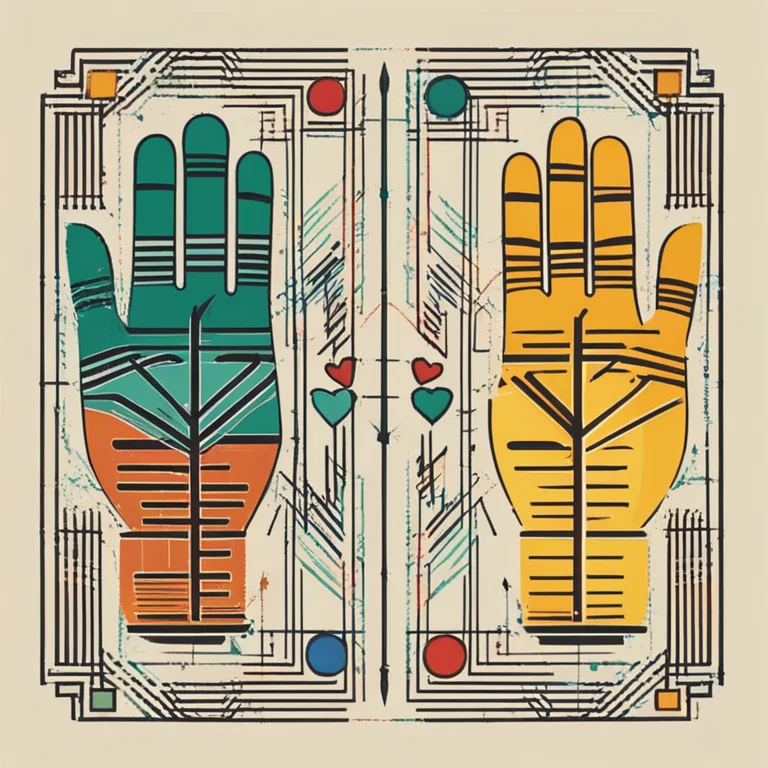
The Intricacies of Palm Line Explanation
Delve into the lines of your palm to uncover the science behind palmistry's ancient traditions and modern perspectives.
article by Nora Pennington
The Science Behind Palmistry
Palmistry, or chiromancy, is an age-old practice that claims to decipher one's personality traits, future prospects, and health tendencies based upon the lines and features of the hands. Historically viewed as a form of divination, modern enthusiasts and researchers have searched for a more scientific foundation to understand these palm patterns. This multidisciplinary interest has brought forth a more nuanced approach that considers genetic factors, embryological development, and psychological attributes as potential influences on the lines etched in our palms.

Palm Lines and Their Meanings
The major lines commonly assessed in palmistry are the heart line, head line, life line, and fate line. These primary creases are believed to represent key aspects of one's life, including emotions, intellect, vitality, and life changes. An important disclaimer, though, is that modern palmistry does not hold deterministic views but rather sees these lines as indicators of tendencies or possibilities, echoing a more psychological rather than predictive perspective.

Analyzing Hand Shapes and Lines
It's essential to consider the hand's shape, size, and the interplay of lines and mounts when analyzing palms. A comprehensive examination involves the texture of the skin, the flexibility of the joints, and the prominence of knuckles. Each feature corresponds to different characteristics and potential life experiences. This intricate analysis demands a depth of knowledge and an appreciation for the complexity of human experiences.

Modern Palmistry and Science
While traditional palmists rely on esoteric knowledge and intuition, the field of dermatoglyphics, a branch of science studying the patterns of skins' ridges and lines, acknowledges genetic links to certain palm line formations. Current research also involves exploring the correlation between palm lines and certain medical conditions, bringing an intersection of health and palm interpretations.

Technology in Palm Line Analysis
Technology advances have paved the way for new methods of palm analysis. High-definition imaging and software algorithms allow for a more precise mapping of palm lines. These digital analyses can aggregate data, identify patterns, and even aid in scientific studies, marrying the sophistication of technology with the nuanced art of palm reading.
The Skeptic's Viewpoint
Despite its persistence through the ages, palmistry's legitimacy is often debated. Skeptics point to the lack of empirical evidence and reproducibility of results as major weaknesses in the practice. It's crucial for both practitioners and enthusiasts to maintain a critical eye and acknowledge that while palmistry can offer insightful reflections, it may not subscribe to conventional scientific methodologies.
Future Paths for Palmistry
The future of palmistry, as with many other traditions experiencing a resurgence in the digital age, may thrive on the delicate balance between embracing scientific inquiry and preserving the mystical allure that has captivated humans for centuries. As long as there's an appetite for self-exploration and discovery, the lines on our palms will continue to fascinate and provoke curiosity.
Published: 1/10/2024
Modified: 1/10/2024
More predictions
Come back here soon to learn more about yourself and your future


The Essence of Palmistry: Insights into Your Palm
Delve into the fascinating world of palmistry and discover what the lines on your palm reveal about your life path and personality, with contemporary relevance for the modern seekers.


The Secrets of Hand Analysis
Delve into the intriguing world of palm reading and discover the hidden aspects of your personality through the lines and shapes in the palms of your hands.


Guide to Palmistry: Interpreting Your Palm Lines
Discover the ancient art of palmistry with our comprehensive guide to reading and interpreting the lines on your palms.